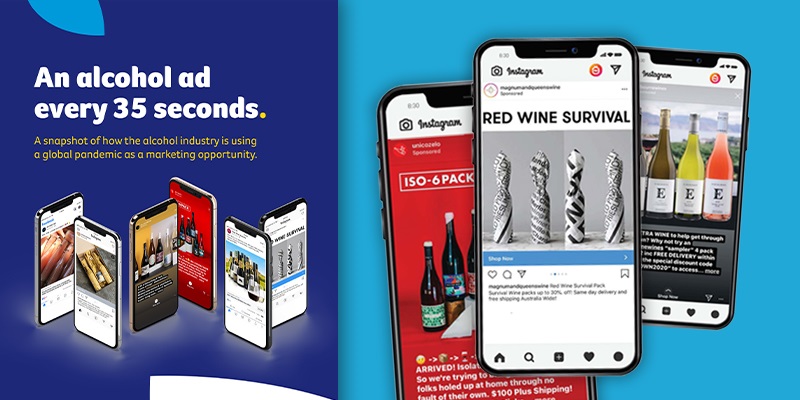A new report has been released today showing the extent to which the alcohol industry is using the COVID-19 pandemic to market their products.
In just one hour on a Friday night, 107 sponsored alcohol advertisements were displayed on a person’s Facebook and Instagram accounts, which equates to approximately one alcohol advertisement every 35 seconds.
Cancer Council WA Alcohol Program Manager Julia Stafford says there were six key marketing messages identified in the sample of alcohol advertisements analysed in the report:
- get easy access to alcohol without leaving your home (58%)
- save money (55%)
- buy more (35%)
- drink alcohol during the COVID-19 pandemic (24%)
- use alcohol to cope, ‘survive’, or feel better (16%)
- and choose ‘healthier’ alcohol products (14%).
“Over 100 alcohol ads in one hour demonstrates the relentlessness of digital alcohol marketing during the COVID-19 restrictions. Many of these ads promoted buying more alcohol and drinking alcohol to cope or ‘survive’ isolation and the pandemic,” Ms Stafford said.
“With phrases like ‘wine from home’, ‘Stay in. Drink up’, and ‘confinement sale’, it’s evident the alcohol industry is using a global health crisis to its advantage,” she said.
Nearly three-quarters of alcohol ads (71%) explicitly or implicitly referenced the COVID-19 pandemic, while two-thirds (66%) had a ‘shop now’ or ‘get offer’ button linking directly to their online store.
Foundation for Alcohol Research and Education CEO Caterina Giorgi says people are being bombarded with unrelenting alcohol advertising encouraging people to drink at a time when people are socially isolated, feeling anxious and facing economic uncertainty.
“This study shows that alcohol companies are taking advantage of people’s fear and anxiety by urging us to drink alcohol to cope with isolation. This is all happening while people’s lives have been turned upside down because of COVID-19,” Ms Giorgi said.
Shanna Whan is from rural NSW and founded a grassroots bush charity called Sober in the Country after her experience with alcohol dependence. Shanna leads conversations to break down stigma and drive cultural change around alcohol use.
“I am disheartened by the alcohol industry’s shameless push to get their product and their advertising into every single home while we are in lockdown. It is literally everywhere, every day,” Ms Whan said.
“I am genuinely fatigued and heartbroken by the constant social media posts glorifying coping with ISO by getting drunk because I know the crushing weight it’s adding to our most vulnerable; like those in early recovery, or shaky sobriety, or those who don’t even yet know they’re becoming dependent drinkers,” she said.
Ms Stafford says the way the alcohol industry has utilised this difficult time to market their products shows significant flaws in the alcohol industry’s self-regulatory scheme in Australia, the Alcohol Beverages Advertising Code (ABAC) Scheme.
“The marketing practices of the alcohol industry during the pandemic show that the way that we regulate alcohol advertising in Australia is broken. The industry cannot be trusted to regulate their own marketing,” Ms Stafford said.







